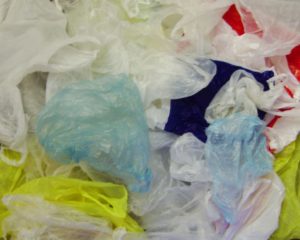
This is a good time to reflect on the state of the Earth. One huge problem is the amount of plastic garbage being generated every year, including single use plastic bags. This has led to the problem of plastics and tiny plastic particles (from plastics degrading) now found everywhere in the environment - including the air, water, our food, and in us. Microplastics are even in our lungs and blood!
Some facts to consider:
- Americans use 100 billion plastic bags a year, which require 12 million barrels of oil to manufacture.3
- Americans use an average of 365 plastic bags per person per year. People in Denmark use an average of four plastic bags per year.4
- It only takes about 14 plastic bags for the equivalent of the gas required to drive one mile. [Full list from Center for Biological Diversity]
It turns out that just twenty companies are the source of more than 50% of single use plastic items (bottles, bags, food packages) that are thrown away. Globally. Number 1 is ExxonMobil, and Dow is number 3. The full list of companies is published by the Plastic Waste Makers Index.
The list is of the top 100 companies in the plastic supply chain. They manufacture polymers - known as the building block of plastics. These 100 companies are responsible for over 90% of single-use plastics generated globally. Single-use plastics are made almost exclusively from fossil fuels (coal, oil, and natural gas).
The future: More states are passing single-use plastic bag bans, which apply to grocery stores (e.g., California, NY, NJ). Expect to see this policy spread to other states. Expect bans to eventually occur globally.
From CNBC.com, originally published May, 2021: Just 20 companies are responsible for over half of ‘throwaway’ plastic waste, study says
- Single-use plastics, such as bottles, bags and food packages, are the most commonly discarded type of plastic.
- Made almost exclusively from fossil fuels, these “throwaway” plastics often end their short lifecycle polluting the oceans, being burned or dumped into landfills.
- The report warns that plastic production is set to grow by 30% in the next five years, creating even more plastic waste and exacerbating the climate emergency.
Just 20 companies are the source of more than half of single-use plastic items thrown away globally, according to a study that highlights the devastating impact on the environment.
The Plastic Waste Makers Index, published Tuesday, names the companies that are at the forefront of the plastic supply chain and manufacture polymers, known as the building block of plastics. It also highlighted that the firms identified are supported by a small number of financial backers.
The findings were published by the Minderoo Foundation, one of Asia’s largest philanthropies. The research was conducted by academics from the London School of Economics, the Stockholm Environment Institute, Wood Mackenzie, among others.
U.S. energy giant ExxonMobil tops the list, contributing 5.9 million metric tons to global plastic waste, closely followed by U.S. chemicals company Dow and China’s Sinopec. The study says 100 companies are the source of 90% of global single-use plastic production.
Nearly 60% of the commercial finance funding the plastic waste crisis comes from just 20 global banks, the study said. A total of $30 billion of loans from these institutions, including Barclays, HSBC and Bank of America, has supported the sector since 2011.
The research also assessed the countries that are the biggest contributors to the single-use plastic crisis, based on per head of population. Australia and the U.S., respectively, were found to produce the greatest amounts of “throwaway” plastics, at more than 50 kg per person per year in 2019.
By contrast, the average person in China — the largest producer of single-use plastic by volume — produces 18 kg of single-use plastic per year. For India, that figure is as low as 4 kg per year, the study said.
